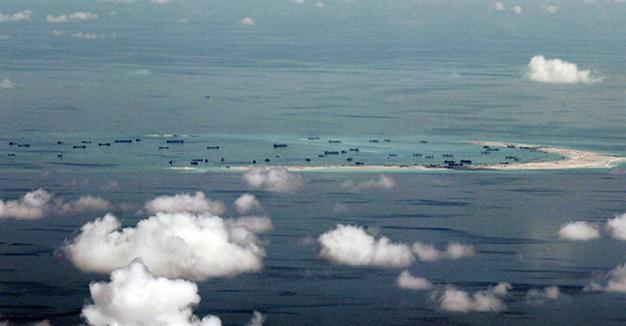Tribunal says China has no historic title over South China Sea
AMSTERDAM/BEIJING – Reuters

An arbitration court ruled on July 12 that China has no historic title over the waters of the South China Sea and that it has breached the sovereign rights of the Philippines with its actions there, infuriating a defiant Beijing.
China, which has boycotted the hearings at the Permanent Court of Arbitration in The Hague, vowed again to ignore the ruling and said its armed forces would defend its sovereignty and maritime interests.
China’s state-run Xinhua news agency said shortly before the ruling was announced that a Chinese civilian aircraft successfully carried out calibration tests on two new airports in the disputed Spratly Islands.
And China’s Defense Ministry announced that a new guided missile destroyer was formally commissioned at a naval base on the southern island province of Hainan, which has responsibility for the South China Sea.
China claims most of the energy-rich waters through which about $5 trillion in ship-borne trade passes every year. Neighbors Brunei, Malaysia, the Philippines, Taiwan and Vietnam also have claims.
Finding for the Philippines on a number of issues, the panel said there was no legal basis for China to claim historic rights to resources within its so-called nine-dash line, which covers much of the South China Sea.
It said China had interfered with traditional Philippine fishing rights at Scarborough Shoal, one of the hundreds of reefs and shoals dotting the sea, and had breached the Philippines’ sovereign rights by exploring for oil and gas near the Reed Bank, another feature in the region.
None of China’s reefs and holdings in the Spratly Islands entitled it to a 200-mile exclusive economic zone, it added.
China’s Foreign Ministry comprehensively rejected the ruling, saying its people had more than 2,000 years of history in the South China Sea, that its islands did have exclusive economic zones and that it had announced to the world its “dotted line” map in 1948.
“China’s territorial sovereignty and maritime rights and interests in the South China Sea shall under no circumstances be affected by those awards. China opposes and will never accept any claim or action based on those awards,” it said.
“The award is null and void and has no binding force,” the ministry said. “China neither accepts nor recognizes it.”
However, the ministry also repeated that China respected and upheld the freedom of navigation and overflight and that China was ready to keep resolving the disputes peacefully through talks with states directly concerned.
The ruling also said China had caused permanent harm to the coral reef ecosystem in the Spratlys, charges China has always rejected.
The judges acknowledged China’s refusal to participate, but said they sought to take account of China’s position on the basis of its statements and diplomatic correspondence.
The ruling is significant as it is the first time that a legal challenge has been brought in the dispute, which covers some of the world’s most promising oil and gas fields and vital fishing grounds.
It reflects the shifting balance of power in the 3.5 million sq km sea, where China has been expanding its presence by building artificial islands and dispatching patrol boats that keep Philippine fishing vessels away.
The United States and China often conduct military exercises in the area and regularly accuse each other of militarizing the region.
“Our experts are studying the award with the care and thoroughness that this significant arbitral outcome deserves,” Philippine Foreign Affairs Secretary Perfecto Yasay told a news conference, reading from a prepared statement.
“We call on all those concerned to exercise restraint and sobriety. The Philippines strongly affirms its respect for this milestone decision as an important contribution to the ongoing efforts in addressing disputes in the South China Sea.” Japan said the ruling was legally binding and final.
 An arbitration court ruled on July 12 that China has no historic title over the waters of the South China Sea and that it has breached the sovereign rights of the Philippines with its actions there, infuriating a defiant Beijing.
An arbitration court ruled on July 12 that China has no historic title over the waters of the South China Sea and that it has breached the sovereign rights of the Philippines with its actions there, infuriating a defiant Beijing.